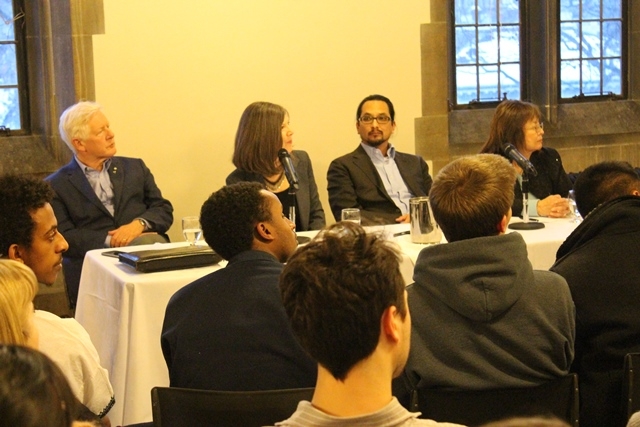From left: Alumni Bob Rae, Mayo Moran, Douglas Sanderson at the Hart House discussion on the residential schools system with lawyer Delia Opekokew.
Story and Photos by David Kumagai, 3L
Bob Rae is urging the next generation of Canadians to confront Canada’s legacy of abuse against Aboriginal peoples.
“Canada’s history is a history of colonialism, that’s who we are, that’s where we come from as a country,” Rae told a room full of students at the University of Toronto last Wednesday. “We haven’t even come close to addressing the extent of the injustice,” Rae said.
The former premier of Ontario and Faculty of Law alumnus, LLB 1977, was participating in a panel discussion about the lasting consequences of Canada’s Indian Residential School system, and the future of Canada’s relationship with Aboriginal communities.
The decades-long education policy forcibly removed more than 150,000 Aboriginal students from their communities to attend Christian boarding schools, where they were forbidden to speak their own languages or practise their own faiths. The ongoing Indian Residential Schools Truth and Reconciliation Commission has further exposed the extent of physical and sexual abuse suffered by the students of the program, which ended in 1996. It is estimated that at least 4,000 students died in residential schools.
Rae currently works with First Nations across Canada as a senior partner at Olthuis Kleer Townshend LLP. He was joined on the panel by Faculty of Law professor Douglas Sanderson, a member of the Opaskwayak Cree Nation, who is deeply engaged in Indigenous issues at the law school. Lawyer Delia Opekokew, a member of the Canoe Lake First Nation in Saskatchewan, also spoke. She is among the 80,000 former residential school students living in Canada today, and has spent her career advocating on behalf of First Nations. Former dean, alumna and current provost of Trinity College, Mayo Moran, SJD 1999, moderated the discussion.

Enduring Consequences
The Canadian government officially apologized for the residential school system in 2008. Prime Minister Stephen Harper recognized that “in separating children from their families, we undermined the ability of many to adequately parent their own children and sowed the seeds for generations to follow.”
The panel focused on this particular injustice. As Opekokew explained, one of the most damaging effects of separating children from their parents is that they never learn how to be parents themselves.
“People were never taught to nurture and care for children, and that has been destructive inter-generationally,” Opekokew said.
Sanderson also focused on the lasting impact of the policy. “The damage from the school system drives so much of what’s broken in Aboriginal communities today,” he explained.
The policy of forced assimilation robbed thousands of Canadians of the right to raise their own children. “We learn how to be parents by having parents,” Sanderson explained. “Our communities never experienced that for seven or eight generations,” he said. “For more than 100 years, those communities never heard the sound of children playing.”
Accepting Our History
Moving forward, the panel called for more engagement with this sad chapter of Canadian history. “In order to get people to empathize with the Indigenous condition we need more education,” Sanderson said.
In particular, Sanderson criticized the inaccurate and insulting treatment of Aboriginal people in Ontario curriculum. “The provincial school system still teaches that Aboriginal people are inferior,” he explained.
Moran echoed Sanderson’s concerns. “It’s incredibly important that there is more education about the legacy,” she said. The provost is currently involved in the implementation of the Indian Residential Schools Agreement, the largest class action settlement in Canadian history.
Moran focused on how apathy on the part of many Canadians is a major concern facing the current Truth and Reconciliation Commission. “One of the fears was that no one would listen,” she explained. “In South Africa, everyone was listening on the radio, but is Canada listening now?” The Commission’s final report is expected to be released in June.
Reconciliation
Opekokew has been involved in the TRC, and she emphasized the positive influence it is having on the reconciliation process. “I’ve witnessed the testimony of hundreds of survivors and the impact on their lives – their children’s lives, their grandchildren’s lives – is overwhelming. And yet I see reason for hope,” she said. “So many people have chosen a path of reconciliation, and I think that is important to acknowledge.”
Everyone on the panel conceded that the road to reconciliation will be long and difficult. “Money and criminal trials do nothing to help people who were taught to hate their culture, their families and their communities,” Sanderson explained.
However, one proposal endorsed by Sanderson is for Indigenous people to take more legal and governmental authority over their territories. For instance, he said First Nations should be getting their share of the billions in dollars that timber companies pay to provincial governments for licenses to operate on Aboriginal land. “[There is] no reason on earth why First Nations shouldn’t be collecting those fees,” he said.
For his part, Rae is concerned about the possibility that Canadians decide “we’ve closed the door” on this chapter of history. “Prime Minister Harper gave a very eloquent apology,” Rae explained, “but now that we’ve said ‘We’re sorry’, what else are we going to do?”
The Hart House Debates Committee and the University of Toronto Aboriginal Law Program organized the event.


